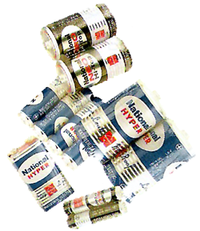
Photo from wikipedia
Thermal batteries with molten salt electrolytes are used for many military applications, primarily as power sources for guided missiles. The Li–B/CoS2 couple is designed for high-power, high-voltage thermal batteries. However,… Click to show full abstract
Thermal batteries with molten salt electrolytes are used for many military applications, primarily as power sources for guided missiles. The Li–B/CoS2 couple is designed for high-power, high-voltage thermal batteries. However, their capacity and safe properties are influenced by acute self-discharge that results from the dissolved lithium anode in molten salt electrolytes. To solve those problems, in this paper, carbon coated CoS2 was prepared by pyrolysis reaction of sucrose at 400 °C. The carbon coating as a physical barrier can protect CoS2 particles from damage by dissolved lithium and reduce the self-discharge reaction. Therefore, both the discharge efficiency and safety of Li–B/CoS2 thermal batteries are increased remarkably. Discharge results show that the specific capacity of the first discharge plateau of carbon-coated CoS2 is 243 mA h g−1 which is 50 mA h g−1 higher than that of pristine CoS2 at a current density of 100 mA cm−2. The specific capacity of the first discharge plateau at 500 mA cm−2 for carbon-coated CoS2 and pristine CoS2 are 283 mA h g−1 and 258 mA h g−1 respectively. The characterizations by XRD and DSC indicate that the carbonization process has no noticeable influence on the intrinsic crystal structure and thermal stability of pristine CoS2.
Journal Title: RSC Advances
Year Published: 2018
Link to full text (if available)
Share on Social Media: Sign Up to like & get
recommendations!